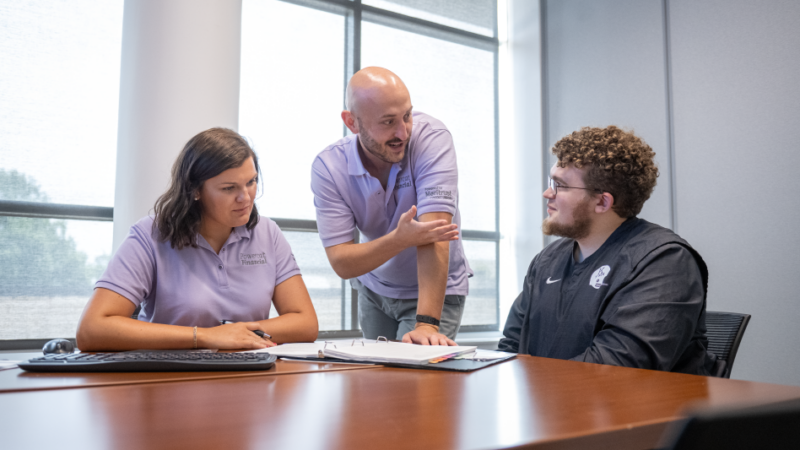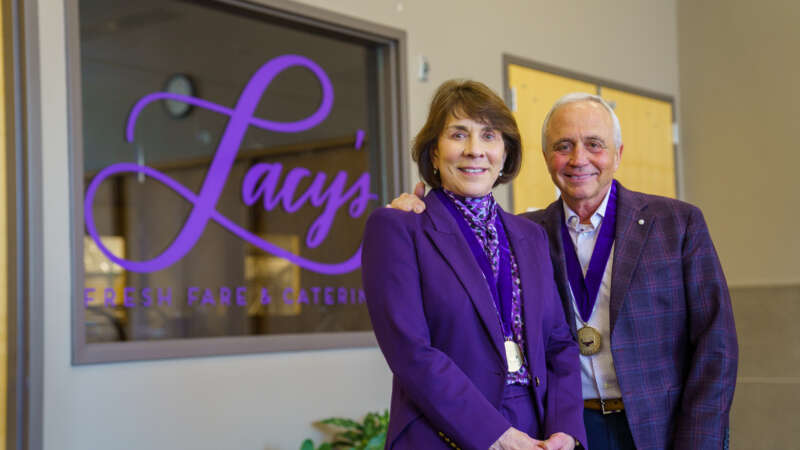senior in nutritional sciences and microbiology, Hutchinson, Kansas
Determination. Persistence. Perseverance. These qualities brought Garrett Wilkinson of Hutchinson, Kansas, to Kansas State University, and they’ve led him to earn the prestigious Marshall Scholarship, funding two years of continued education in the United Kingdom. Those characteristics will also help Garrett in the difficult profession he is passionate in pursuing — global health provider and advocate for social justice.
“At a very young age, my parents talked to me about college and how important it was to make sure you could afford it because they were still paying off their student loans,” Garrett said. “As soon as I got to high school, I started thinking about scholarships and where I could go to college. I set my sights on getting the Putnam scholarship. The minimum ACT score to qualify for the Putnam is 32. I’m a pretty terrible test taker, so I had to take the ACT seven times. I developed my own training program, and over the course of a year and a half, I finally got a 32 on my seventh try.”
It was that determination and hard work that landed Garrett the Putnam and many other scholarships that funded his research into a variety of public health, education and social justice projects.
“My passion is centered around a moral ambition to alleviate suffering in people, focused around public health,” Garrett explained. “There is a lot of suffering that is not only unfortunate but also wrong and a part of global and social economic forces that are unjust. I became interested in addressing poverty and its related issues at a young age. My parents, both public school teachers, saw much unnecessary economic suffering and made sure to make me aware of it.”
Garrett’s impressive resume reads as if for someone much older, as he’s done so much in a short amount of time. At K-State, Garrett helped start the food pantry for students, managed Hands On K-State volunteers, and helped land a $25,000 grant for the Healthy Communities Laboratory to produce local journalism on health inequities in Riley County. He also founded RESULTS K-State, an organization that teaches others how to advocate for domestic and international antipoverty policies by lobbying Congress and the state legislature.
Garrett has also used his skills to benefit people around the world. He helped start the nonprofit Open World Cause, which supports educators in Nepal and Kenya and provides school nutrition programs and purified water for those communities. He’s worked with Dr. Brian Lindshield, associate professor of food, nutrition, dietetics and health, to develop food aid supplements that will be used by the United States government to assist people in developing countries who are suffering from famine or food insecurity. Currently, he’s working with Harvard’s Center for Global Health Delivery in Dubai overseeing grants that fund efforts to bridge the gap in global health delivery.
Nearly all of Garrett’s work was supported by scholarships that gave him the freedom to conduct research, travel and collaborate with colleagues. These scholarships include the Mark Chapman Scholarship, the Nancy Landon Kassebaum Scholarship, the Marjorie J. and Richard L. D. Morse Family and Community Public Policy Scholarship, Kansas State University Civic Leadership Scholarship, the College of Human Ecology Hannah Bluemont Scholarship, and the Child and Family Health International Thomas Hall Scholarship.
With a degree in nutritional science and microbiology, Garrett will continue his studies this fall at the London School of Hygiene and Tropical Medicine, working toward a Ph.D. in public health.
“Treating illness is a morally righteous project, which is what originally drew me to health,” Garrett said. “In my time at K-State, I began to notice that many sick people I encountered experienced a greater risk of illness because of their social and economic status. Their illnesses were rooted in things like food and housing insecurity or an inability to afford medical care. These problems stemmed from a social and economic order, created by humans, which I came to see as fundamentally unjust. During my time at K-State, I saw how professors I worked with applied their skills to real problems. Seeing how this can save human lives and eradicate poverty made me committed to this work.”



